The history of Gujarati literature may be traced to 1000 AD, and this literature has flourished since then to the present. It is unique in having almost no patronage from a ruling dynasty, other than its composers.

Jhaverchand or Zaverchand Kalidas Meghani was an Indian poet, writer, social reformer and freedom fighter. He is a well-known name in the field of Gujarati literature. He was born in Chotila where the Government College has been renamed for this literary figure as Raashtreeya Shaayar Zaverchand Meghani College, Chotila. Mahatma Gandhi spontaneously gave him the title of Raashtreeya Shaayar. Besides this he received many awards like Ranjitram Suvarna Chandrak and Mahida Paaritoshik in literature. He authored more than 100 books. His first book was a translation work of Rabindranath Tagore's called Kathaa-u-Kaahinee titled Kurbani Ni Katha which was first published in 1922. He contributed widely to Gujarati folk literature. He went from village to village in search of folk-lores and published them in various volumes of Saurashtra Ni Rasdhar. He was also the Editor of Phulchhab Newspaper of Janmabhoomi group.
Weaving and cloth trading communities of Western India particularly of Gujarat are called Vankar/Wankar/Vaniya. The four major woven fabrics produced by these communities are cotton, silk, khadi and linen. Today majority of these community members are not engaged in their ancestral weaving occupation still some population of these community contribute themselves in traditional handloom weaving of famous Patola of Patan, Kachchh shawl of Bhujodi in Kutch, Gharchola and Crotchet of Jamnagar, Zari of Surat, Mashroo of Patan and Mandvi in Kutch, Bandhani of Jamnagar, Anjar and Bhuj, Motif, Leheria, Dhamakda and Ajrak, Nagri sari, Tangaliya Shawl, Dhurrie, Kediyu, Heer Bharat, Abhala, Phento and art of Gudri. Vankar is described as a caste as well as a community.
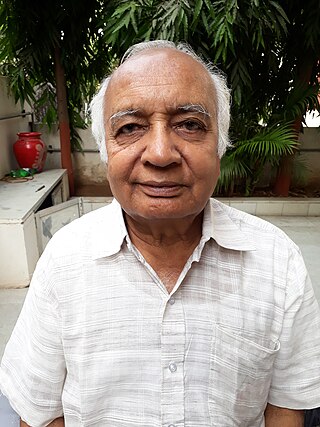
Shirish Jagjivandas Panchal is a Gujarati critic, fiction writer, translator and editor. He won the 2009 Sahitya Akademi Award for Gujarati language for his criticism Vaat Aapanaa Vivechan-ni. He refused the award.

Ramesh Parekh (1940-2006) was a Gujarati poet and lyricist from Gujarat, India. He was one of the most popular poets of modern Gujarati poetry. Though government servant by profession, he had deep interest in literature and music. He contributed heavily in field of poetry including geet, ghazal and non-lyrical poetry. He also wrote stories and contributed in Gujarati children's literature.
Ramanlal Jethalal Joshi was Gujarati language literary critic and editor from India. He studied and later taught at Gujarat University in Ahmedabad. He served at several literary and educational institutions. He edited, authored and published criticism in more than forty-two books. He was awarded the Sahitya Akademi award in 1984.
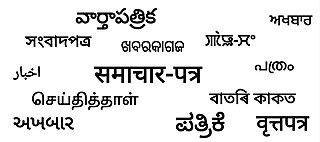
The Media in Gujarati language started with publication of Bombay Samachar in 1822. Initially the newspapers published business news and they were owned by Parsi people based in Bombay. Later Gujarati newspapers started published from other parts of Gujarat. Several periodicals devoted to social reforms were published in the second half of the 19th century. After arrival of Mahatma Gandhi, the Indian independence movement peaked and it resulted in proliferation of Gujarati media. Following independence, the media was chiefly focused on political news. After bifurcation of Bombay state, the area of service changed. Later there was an increase in readership due to growth of literacy and the media houses expanded its readership by publishing more number of editions. Later these media houses ventured into digital media also. The radio and television media expanded after 1990.
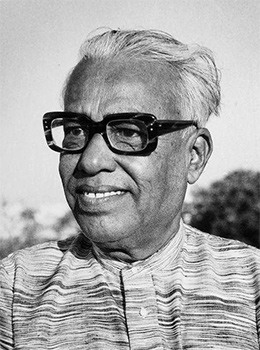
Abdulgani Abdulkarim Dahiwala (1908-1987), popularly known as Gani Dahiwala was a Gujarati poet.

Rajesh Vankar is a Gujarati writer from Gujarat, India. He won the Yuva Puraskar of Sahitya Akademi, New Delhi in 2015 for his story collection Maalo. He is currently an editor of Parivesh.
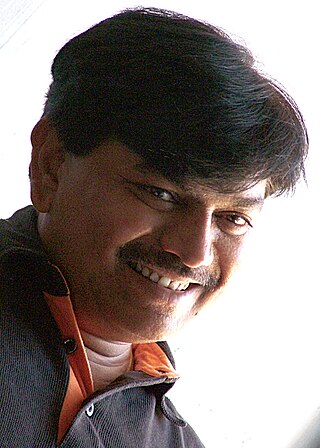
Sanju Vala is a Gujarati poet and critic of postmodernism from Gujarat, India. He authored more than 10 books and received numerous literary awards.
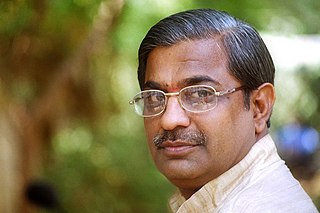
Rajesh Vyas, better known by his pen name Miskin, is a Gujarati poet from India. Born and brought up in Ahmedabad, he completed his doctorate in Gujarati literature. He writes ghazal poetry and columns in various publications.
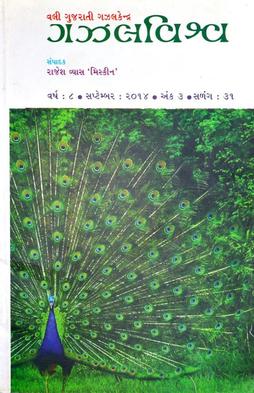
Gazalvishwa is a quarterly Gujarati ghazal poetry journal, published by Vali Gujarati Gazal Kendra from Gandhinagar, Gujarat, India since 2006. The journal publishes ghazals, ghazal reviews, critical works and interviews of ghazal poets.

Anil Chavda is a Gujarati language poet, writer and columnist from Gujarat, India.
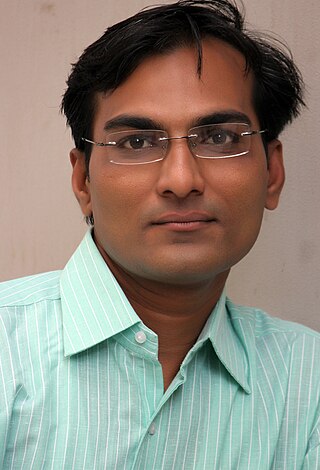
Ashok Chavda, also known by his pen name Bedil, is a Gujarati poet, writer and critic from Gujarat, India. His anthology of poetry, Dalkhi Thi Saav Chhutan (2012), was awarded the Yuva Puraskar by the Sahitya Akademi in 2013. His collection of known writings include Pagla Talaavma (2003), Pagarav Talaavma (2012), Tu Kahu Ke Tame (2012), Pityo Ashko (2012), Shabdoday (2012), and Ghazalistan (2012), which is a translation of Urdu ghazals written by Indian and Pakistani poets. He is also a recipient of the Yuva Gaurav Award (2012) from the Gujarat Sahitya Akademi, and the Dasi Jivan Award (2013–14) from the Government of Gujarat. He has appeared in several TV and radio programs on All India Radio and Doordarshan.
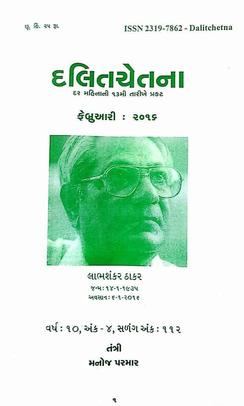
Dalitchetna is a Gujarati language monthly magazine published on 13th of every month under the editorship of Manoj Parmar. The magazine was founded in 2006 with the purpose of the blooming of Gujarati Dalit literature.

Gujarati Tunki Vartama Pariveshni Karyasadhakta is an analysis of Gujarati short stories that served as Rajesh Vankar's doctoral dissertation.

Malela Jeev is a Gujarati language romance novel written by Pannalal Patel. Alongside Manvini Bhavai, it is one of Patel's two most widely acclaimed novels. It is a romantic tragedy of Kanji and Jivi, born in different castes. It follows the troubles they face in their love story.
Kamal Vora is a Gujarati language poet and editor from Mumbai, India. He is an editor of Etad, a quarterly Gujarati literary magazine.
Rasiklal Chhotalal Parikh (1897–1982) was a 20th-century Gujarati poet, playwright, literary critic, Indologist, historian, and editor from Gujarat, India. He was the president of Gujarat Sahitya Sabha and was appointed the president of Gujarati Sahitya Parishad in 1964. He received the Sahitya Akademi Award in 1960 for his play Sharvilak. He is also a recipient of the Ranjitram Suvarna Chandrak and the Narmad Suvarna Chandrak.














